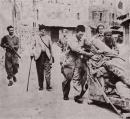In nineteen hundred forty five
Among the Jews who were left alive
There came a visionary man
Who turned his wrath into a plan
Abba Kovner was his name
As a partisan he earned his fame
He was a Vilna rebel Jew
A poet warrior through and through
He met some surviving ghetto fighters
Zionists and socialists conspired
They gathered in a Lublin flat
And round the kitchen table sat
They gave themselves a Hebrew name
And with this word they did proclaim
That vengeance is what god would will,
Were there a god, and so they’d kill
Six million Germans
You might say it was insane
Six million Germans
That it was misdirected pain
Six million Germans
They didn’t want the war to end
Six million Germans
They wanted one thing - Nakam: Revenge
For every Jew the Nazis gassed
For every racist law they passed
For every wrong that wasn’t right
For all the dead Nakam would fight
They formed a band of forty strong
To straighten out what had been wrong
They chose to poison water mains
Just as the Jews of old were blamed
In Nuremberg and Hamburg town
Their agents worked the underground
They took up jobs by the riverside
And waited for the poison to arrive
And Kovner went to Tel Aviv
To see what help he could receive
But the Haganah did not agree
To join in his conspiracy
Six million Germans
You might say it wasn’t right
Six million Germans
An eye for and eye leaves all without sight
Six million Germans
They didn’t want to make amends
Six million Germans
They wanted one thing - Nakam: Revenge
So Abba Kovner headed back
With viles of poison in his sack
Upon an English navy ship
But to his plan the brits were tipped
They took him into custody
And the poison fell into the sea
Kovner spent a year in jail
And so plan A did not prevail
The rest of the group it was dispersed
And all their backup plans were cursed
But an agent in a bakery
Secured some poison from Paris
As soon as the poisoned bread had risen
He took it to an allied prison
And various reports have said
There were hundreds of SS prisoners dead
Six million Germans
You might say that it was wrong
Six million Germans
But were their actions weak or strong?
Six million Germans
And who are we to judge and condemn?
Six million Germans
They wanted one thing - Nakam: Revenge
And so Nakam was all disbanded
On Palestina’s shore they landed
And Abba Kovner and his crew
Became like many other Jews
They put aside their rage and hate
And worked to build a Jewish state
With Jewish towns and Jewish farms,
Jewish guns and nuclear arms
Can vengeance put upon a shelf
Be taken out later on someone else?
Well be careful how you read this tale.
‘Lest your own prejudice prevail
For look around the world today
And consider the role that vengeance plays
‘Cause history has its unpaid debts
And is it better if we forget?
Six million Germans
You might say it was absurd
Six million Germans
But what becomes of a debt deferred
Six million Germans
How could they just start again?
Six million Germans
They wanted one thing - Nakam: Revenge
Among the Jews who were left alive
There came a visionary man
Who turned his wrath into a plan
Abba Kovner was his name
As a partisan he earned his fame
He was a Vilna rebel Jew
A poet warrior through and through
He met some surviving ghetto fighters
Zionists and socialists conspired
They gathered in a Lublin flat
And round the kitchen table sat
They gave themselves a Hebrew name
And with this word they did proclaim
That vengeance is what god would will,
Were there a god, and so they’d kill
Six million Germans
You might say it was insane
Six million Germans
That it was misdirected pain
Six million Germans
They didn’t want the war to end
Six million Germans
They wanted one thing - Nakam: Revenge
For every Jew the Nazis gassed
For every racist law they passed
For every wrong that wasn’t right
For all the dead Nakam would fight
They formed a band of forty strong
To straighten out what had been wrong
They chose to poison water mains
Just as the Jews of old were blamed
In Nuremberg and Hamburg town
Their agents worked the underground
They took up jobs by the riverside
And waited for the poison to arrive
And Kovner went to Tel Aviv
To see what help he could receive
But the Haganah did not agree
To join in his conspiracy
Six million Germans
You might say it wasn’t right
Six million Germans
An eye for and eye leaves all without sight
Six million Germans
They didn’t want to make amends
Six million Germans
They wanted one thing - Nakam: Revenge
So Abba Kovner headed back
With viles of poison in his sack
Upon an English navy ship
But to his plan the brits were tipped
They took him into custody
And the poison fell into the sea
Kovner spent a year in jail
And so plan A did not prevail
The rest of the group it was dispersed
And all their backup plans were cursed
But an agent in a bakery
Secured some poison from Paris
As soon as the poisoned bread had risen
He took it to an allied prison
And various reports have said
There were hundreds of SS prisoners dead
Six million Germans
You might say that it was wrong
Six million Germans
But were their actions weak or strong?
Six million Germans
And who are we to judge and condemn?
Six million Germans
They wanted one thing - Nakam: Revenge
And so Nakam was all disbanded
On Palestina’s shore they landed
And Abba Kovner and his crew
Became like many other Jews
They put aside their rage and hate
And worked to build a Jewish state
With Jewish towns and Jewish farms,
Jewish guns and nuclear arms
Can vengeance put upon a shelf
Be taken out later on someone else?
Well be careful how you read this tale.
‘Lest your own prejudice prevail
For look around the world today
And consider the role that vengeance plays
‘Cause history has its unpaid debts
And is it better if we forget?
Six million Germans
You might say it was absurd
Six million Germans
But what becomes of a debt deferred
Six million Germans
How could they just start again?
Six million Germans
They wanted one thing - Nakam: Revenge
inviata da Bartleby - 9/3/2011 - 12:14
Rirerrei che la canzone di cui vado a portare il link è più che meritevole di questo sito, per il testo, che si qualifica, e per la musica in sé, che trovo bellissima.
Tuttavia la mia povertà linguistica non mi spinge ad azzardarmi a una traslitterazione, che oltre all'inglese contiene (yiddish? Tedesco? Arabo e/o russo? Che ne so io?)
Lascio il compito a qualcuno di più preparato e volenteroso
Tuttavia la mia povertà linguistica non mi spinge ad azzardarmi a una traslitterazione, che oltre all'inglese contiene (yiddish? Tedesco? Arabo e/o russo? Che ne so io?)
Lascio il compito a qualcuno di più preparato e volenteroso
Leoskini - 7/11/2019 - 09:07
×
![]()








Album “Partisans & Parasites”
Non c’è da stupirsi quindi se in un disco così intitolato Kahn ci proponga una canzone che è tutt’altro che una CCG/AWS, anzi, perché ci racconta la storia vera di un uomo che combattè contro demoni sanguinari che avevano cercato di annientare lui e l’intero suo popolo ma non si accontentò di vincerli perché le sofferenze ed il dolore subiti erano tali da non poter essere placati se non con la più sanguinaria delle vendette. “Occhio per occhio, dente per dente”, era il piano tanto semplice quanto mostruoso da lui architettato per vendicarsi dei carnefici della sua gente: fallì, ma quel sentimento così forte, così puro, così feroce rimase ad impregnare la Storia, così come il sangue dei sei milioni di ebrei uccisi dai nazisti durante la seconda guerra mondiale. E fu forse anche quel terribile sentimento che contribuì alla costruzione di un rifugio sicuro per tutti gli ebrei, lo Stato di Israele, una fortezza che doveva essere per sempre inespugnabile, contro tutto e contro tutti, talvolta anche contro la ragione e la verità, in nome della vita che nemmeno il diavolo era riuscito ad estirpare, in nome delle sofferenze inenarrabili patite, in nome della sfiducia negli altri uomini, in nome della nakam, la vendetta.
“Noi sopravviveremo
Siamo un popolo eterno.
Non importa quanto sia infelice
La stagione, il momento,
Noi sopravviveremo.”
(da מיר לעבן אײביק)
Il protagonista di questa storia e di questa canzone lo abbiamo già conosciuto:
è Abba Kovner, colui che dopo la morte di Yitzhak Witenberg divenne il capo dei partigiani ebrei protagonisti della fallita insurrezione del ghetto di Vilnius, nel settembre del 1943, e della sua liberazione, insieme ai soldati sovietici e polacchi, nel luglio del 1944.
Abba Kovner era nato a Sebastopoli nel 1918 ma era cresciuto a Vilnius - allora in Polonia, in seguito in Lituania - dove la sua famiglia si era presto trasferita e dove il giovane Abba aveva frequentato la scuola d’arte. Era un convinto sionista ed era un socialista, anche se non so se poi i sovietici gli furono molto simpatici, considerate le porcate che anche lì combinarono soprattutto a partire dal 1939, dopo essersi spartiti nord ed est Europa con i nazisti. Certo è che questi ultimi quanto a porcate e schifezze di ogni sorta erano davvero insuperabili: alla fine della guerra il 95% dei circa 265.000 ebrei lituani era stato sterminato dai nazisti e dai collaborazionisti locali.
Ma Abba Kovner, combattendo, sopravvisse.
Però la guerra per lui non terminò mai. Da sionista, ufficialmente si dava da fare per facilitare il trasferimento degli ebrei sopravvissuti in Palestina. Da combattente, intriso dell’odio verso i carnefici del suo popolo, fondò un’organizzazione segreta chiamata “Dam Yehudi Nakam” (“Il sangue ebreo sarà vendicato”) che – a differenza di altri gruppi simili, come quello dei “Vendicatori” cui si è ispirato Tarantino per il suo “Inglourious Basterds” – si poneva un obiettivo tanto ambizioso quanto mostruoso: non bastava andare in giro per il mondo a scannare criminali nazisti perché tutto il popolo tedesco aveva sostenuto il nazismo e l’intero popolo tedesco era quindi responsabile dello sterminio degli ebrei…
Per 6 milioni di ebrei sarebbero dovuti morire 6 milioni di tedeschi. Occhio per occhio, dente per dente. Così la pensava Abba Kovner.
Non so se avesse davvero il necessario per attuare questo dissennato piano, fatto sta che salpò da Haifa portandosi appresso un consistente quantitativo di veleno, forse arsenico. Per fortuna fu intercettato ed arrestato dai britannici al suo arrivo al porto di Tolone, ma riuscì a nascondere un po’ del veleno che aveva con sé. Così, nell’aprile del 1946, Abba Kovner tentò di porre in atto il suo “piano B”, che consisteva nell’avvelenare i prigionieri di guerra tedeschi detenuti in un campo americano vicino a Norimberga… Riuscì a farcire d’arsenico le pagnotte destinate agli ex SS, riuscì a mandarne un paio di centinaia al pronto soccorso ma niente di più: nessun nemico morì (a differenza di quanto sostiene Daniel Kahn nel testo di questa sua canzone).
Abba Kovner e i suoi compagni del Nakam vennero arrestati e rispediti in Palestina.
Nel 1948 combattè ancora nella guerra arabo-israeliana (la “guerra d’indipendenza” secondo gli israeliani, la “catastrofe” per gli arabi e i palestinesi) come membro della celebre brigata Givati.
Nel 1961 combattè ancora, testimoniando al processo contro il criminale nazista Adolf Eichmann.
Poi si dedicò all’unica cosa che forse riusciva ancora a placare la sua rabbia, la poesia.
Nel 1970 gli fu assegnato il Premio Israele per la letteratura.
Morì nel 1987, dopo aver molto combattuto.
Perché ho proposto questa canzone e questa storia?
Forse per giustificare i propositi criminali di Abba Kovner, pazzo di dolore e di rabbia? No di certo.
Forse per giustificare i diversi ed efferati crimini commessi dai dirigenti israeliani e dalle loro armate ai danni delle popolazioni arabe, palestinesi e libanesi in testa? Nemmeno.
Capire l’enormità del Male ed il corrispondente dolore e la rabbia, altrettanto enormi ed inestinguibili, non vuol dire giustificare i bombardamenti sui quartieri civili di Beirut, i massacri nei campi profughi, la feroce occupazione militare dei Territori, le politiche di apartheid e colonizzazione, il ghetto di Gaza assediato, gli assassinii mirati, l’omicidio di membri di organizzazioni umanitarie…
Voglio dire che mi piacerebbe che Israele si liberasse finalmente dalla collera di Kovner, che riconoscesse finalmente che avere la forza non sempre vuol dire avere ragione e che rinunciasse a continuare ad essere la “fortezza della nakam” ma tornasse finalmente alla sua ispirazione originaria – quella che fu forse solo delle prime aliyah - di una casa per gli ebrei e per tutti gli uomini liberi, in pace.
(Che fottuto, ingenuo utopista che sono…)